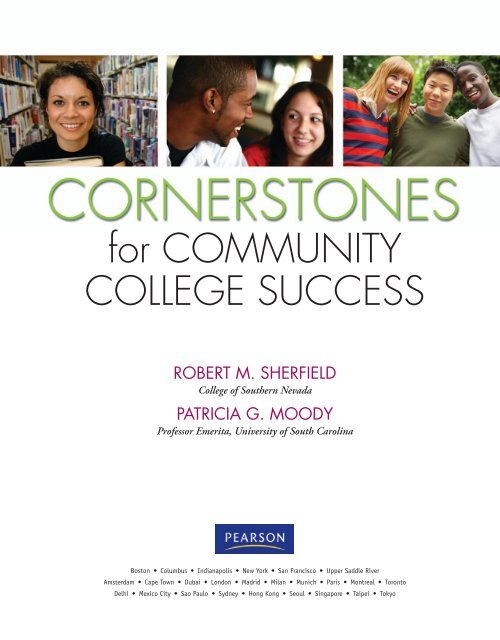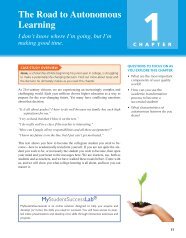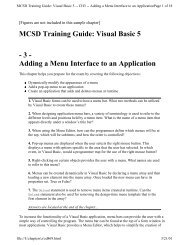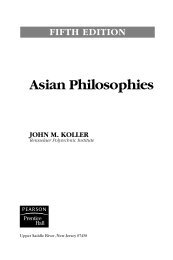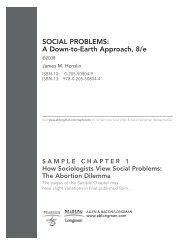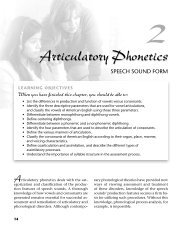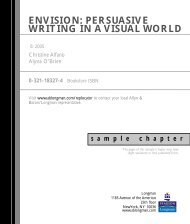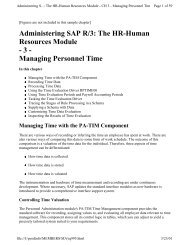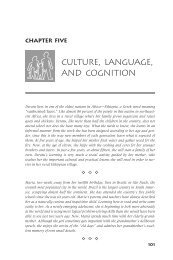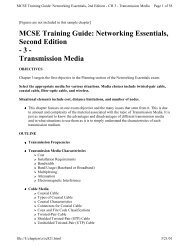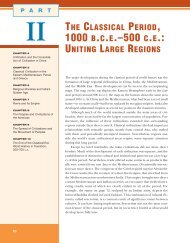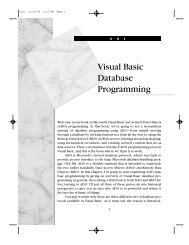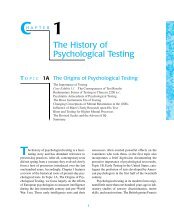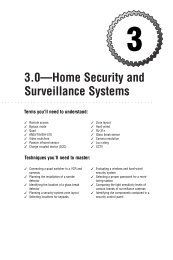cornerstones for community college success - Prentice Hall
cornerstones for community college success - Prentice Hall
cornerstones for community college success - Prentice Hall
Create successful ePaper yourself
Turn your PDF publications into a flip-book with our unique Google optimized e-Paper software.
<strong>for</strong> COMMUNITY<br />
COLLEGE SUCCESS<br />
ROBERT M. SHERFIELD<br />
College of Southern Nevada<br />
PATRICIA G. MOODY<br />
Professor Emerita, University of South Carolina<br />
Boston Columbus Indianapolis New York San Francisco Upper Saddle River<br />
Amsterdam Cape Town Dubai London Madrid Milan Munich Paris Montreal Toronto<br />
Delhi Mexico City Sao Paulo Sydney Hong Kong Seoul Singapore Taipei Tokyo
Editor-in-Chief: Jodi McPherson<br />
Editorial Assistant: Clara Ciminelli<br />
Development Editor: Jennifer Gessner<br />
Marketing Manager: Amy Judd<br />
Production Editor: Janet Domingo<br />
Editorial Production Service: Omegatype Typography, Inc.<br />
Manufacturing Buyer: Megan Cochran<br />
Electronic Composition: Omegatype Typography, Inc.<br />
Interior Design: Carol Somberg/Omegatype Typography, Inc.<br />
Photo Researcher: Annie Pickert<br />
Cover Designer: Linda Knowles<br />
Credits and acknowledgments borrowed from other sources and reproduced, with permission, in this textbook<br />
appear on appropriate page within text.<br />
Copyright © 2012 Pearson Education, Inc., publishing as Allyn & Bacon, 501 Boylston Street,<br />
Boston, MA, 02116. All rights reserved. Manufactured in the United States of America. This<br />
publication is protected by Copyright, and permission should be obtained from the publisher<br />
prior to any prohibited reproduction, storage in a retrieval system, or transmission in any <strong>for</strong>m or<br />
by any means, electronic, mechanical, photocopying, recording, or likewise. To obtain<br />
permission(s) to use material from this work, please submit a written request to Pearson<br />
Education, Inc., Permissions Department, 501 Boylston Street, Boston, MA 02116, or email<br />
permissionsus@pearson.com.<br />
Library of Congress Cataloging-in-Publication Data<br />
Sherfield, Robert M.<br />
Cornerstones <strong>for</strong> <strong>community</strong> <strong>college</strong> <strong>success</strong> / Robert M. Sherfield, Patricia G. Moody.—1st ed.<br />
p. cm.<br />
Includes bibliographical references and index.<br />
ISBN-13: 978-0-13-707338-2 (pbk.)<br />
ISBN-10: 0-13-707338-0 (pbk.)<br />
1. Community <strong>college</strong>s—United States. 2. Community <strong>college</strong> students—<br />
United States. 3. Academic achievement—United States. 4. School-towork<br />
transition—United States. I. Moody, Patricia G. II. Title.<br />
LB2328.15.U6S53 2012<br />
378.1'98—dc22 2010043645<br />
10 9 8 7 6 5 4 3 2 1 WEB 15 14 13 12 11<br />
ISBN 10: 0-13-707338-0<br />
ISBN 13: 978-0-13-707338-2
ABOUT YOUR AUTHORS<br />
Robert M.<br />
Sherfield, Ph.D.<br />
Robert Sherfield has been<br />
teaching public speaking, theater,<br />
and student <strong>success</strong> as well<br />
as working with first-year orientation<br />
programs <strong>for</strong> over 25<br />
years. Currently, he is a professor<br />
at the College of Southern<br />
Nevada, teaching student <strong>success</strong>, professional communication,<br />
public speaking, and drama.<br />
An award-winning educator, Robb was named Educator<br />
of the Year at the College of Southern Nevada. He<br />
twice received the Distinguished Teacher of the Year<br />
Award from the University of South Carolina at Union<br />
and has received numerous other awards and nominations<br />
<strong>for</strong> outstanding classroom instruction and advisement.<br />
Robb’s extensive work with student <strong>success</strong> programs<br />
includes experience with the design and implementation of<br />
these programs—including one that was presented at the<br />
International Conference on the First-Year Experience in<br />
Newcastle upon Tyne, England. He has conducted faculty<br />
development keynotes and workshops at over 350 institutions<br />
of higher education across the United States. He has<br />
spoken in 46 states and several <strong>for</strong>eign countries.<br />
In addition to his co-authorship of Cornerstone: Opening<br />
Doors to Career Success (<strong>Prentice</strong> <strong>Hall</strong>, 2009), he has authored<br />
or co-authored Solving the Professional Development<br />
Puzzle: 101 Solutions <strong>for</strong> Career and Life Planning (<strong>Prentice</strong><br />
<strong>Hall</strong>, 2009), Cornerstone: Discovering Your Potential, Learning<br />
Actively, and Living Well (<strong>Prentice</strong> <strong>Hall</strong>, 2008), Roadways<br />
to Success (<strong>Prentice</strong> <strong>Hall</strong>, 2001), the trade book 365<br />
Things I Learned in College (Allyn & Bacon, 1996), Capstone:<br />
Succeeding Beyond College (<strong>Prentice</strong> <strong>Hall</strong>, 2001), Case<br />
Studies <strong>for</strong> the First Year: An Odyssey into Critical Thinking<br />
and Problem Solving (<strong>Prentice</strong> <strong>Hall</strong>, 2004), The Everything<br />
Self-Esteem Book (Adams Media, 2004), and Cornerstone:<br />
Building On Your Best <strong>for</strong> Career Success (<strong>Prentice</strong> <strong>Hall</strong>,<br />
2006)<br />
Robb’s interest in student <strong>success</strong> began with his own<br />
first year in <strong>college</strong>. Low SAT scores and a dismal high<br />
school ranking denied him entrance into <strong>college</strong>. With the<br />
help of a <strong>success</strong> program, Robb was granted entrance into<br />
<strong>college</strong> and went on to earn five <strong>college</strong> degrees, including a<br />
doctorate. He has always been interested in the social, academic,<br />
and cultural development of students and sees this<br />
book as his way to help students enter the world of work<br />
and establish lasting, rewarding careers. Visit www.robert<br />
sherfield.com.<br />
Patricia G.<br />
Moody, Ph.D.<br />
Patricia G. Moody is Dean<br />
Emerita of the College of Hospitality,<br />
Retail and Sport Management<br />
at the University of<br />
South Carolina, where she has<br />
served on the faculty and in administration<br />
<strong>for</strong> over 30 years.<br />
An award-winning educator, Pat was honored as Distinguished<br />
Educator of the Year at her <strong>college</strong> and as Collegiate<br />
Teacher of the Year by the National Business<br />
Education Association. She was also a top-five finalist <strong>for</strong><br />
the Amoco Teaching Award at the University of South<br />
Carolina. She received the prestigious John Robert Gregg<br />
Award, the highest honor in her field of over 100,000<br />
educators.<br />
Pat has co-authored many texts and simulations, including<br />
Solving the Professional Development Puzzle: 101<br />
Solutions <strong>for</strong> Career and Life Planning; Cornerstone: Discovering<br />
Your Potential, Learning Actively, and Living Well; 365<br />
Things I Learned in College; Capstone: Succeeding Beyond<br />
College; Case Studies <strong>for</strong> the First Year: An Odyssey into Critical<br />
Thinking and Problem Solving; and Cornerstone: Opening<br />
Doors to Career Success.<br />
A nationally known motivational speaker, consultant,<br />
and author, Pat has spoken in most states, has been invited<br />
to speak in several <strong>for</strong>eign countries, and frequently keynotes<br />
national and regional conventions. She has presented<br />
her signature, motivational keynote address, “Fly Like an<br />
Eagle,” to tens of thousands of people, from Olympic athletes<br />
to corporate executives to high school students.<br />
As the dean of her <strong>college</strong>, Dr. Moody led international<br />
trips to build relationships and establish joint research<br />
projects in hospitality. Under her direction, faculty<br />
members in her <strong>college</strong> began a landmark study of Chinese<br />
tourists. Pat now travels the country delivering workshops,<br />
keynotes, and presentations on topics such as Managing<br />
Change, Working in the New Global Community, The<br />
Future of the Future, Student Motivation, and Emotional<br />
Intelligence. She also serves as a personal coach <strong>for</strong> business<br />
executives.<br />
iii
iv CONTENTS<br />
Acknowledgments and Gratitude, viii<br />
BEGIN<br />
THE GOAL OF CORNERSTONES<br />
FOR COMMUNITY COLLEGE<br />
SUCCESS AND OUR<br />
COMMITMENT TO YOU,<br />
page x<br />
PART ONE<br />
CHANGING YOUR THOUGHTS<br />
CHAPTER 1<br />
CREATE<br />
BUILDING YOUR OWN<br />
SUCCESSFUL FUTURE,<br />
page 1<br />
3 WHY READ THIS CHAPTER? 2<br />
3 HOW MY COMMUNITY COLLEGE CHANGED MY LIFE, 3<br />
3 BEFORE YOU READ . . . SCAN & QUESTION, 4<br />
Creating Your Success, 4<br />
Community College and You, 5<br />
Creating Success Through Positive Change, 6<br />
The Times . . . They Are a-Changin’, 7<br />
The M & M Theory, 10<br />
Community College Versus University Studies, 11<br />
The Culture of College, 12<br />
■ SUCCESSFUL DECISIONS:<br />
An Activity <strong>for</strong> Critical Reflection, 18<br />
Building a New You, 19<br />
■ FROM ORDINARY TO EXTRAORDINARY:<br />
Bill Clayton, 20<br />
One Last, Important Word about Your Goals, 23<br />
3 CREATING YOUR NEW REALITY:<br />
Reflections on Change and<br />
Goal Setting, 23<br />
3 CREATE SUCCESS:<br />
Your Journey to University, Career,<br />
and Life Beyond College, 24<br />
3 SQ3R Mastery Study Sheet, 25<br />
CHAPTER 2<br />
ENGAGE<br />
DEVELOPING YOUR PERSONAL<br />
AND ACADEMIC MOTIVATION,<br />
page 26<br />
3 WHY READ THIS CHAPTER? 28<br />
3 HOW MY COMMUNITY COLLEGE CHANGED MY LIFE, 29<br />
3 BEFORE YOU READ . . . SCAN & QUESTION, 30<br />
iv<br />
The Power and Passion of Motivation, 30<br />
The Need to Be More, 32<br />
The “First-Generation” Gap, 33<br />
Achieving Your Potential and Increasing<br />
Your Motivation, 34<br />
■ SUCCESSFUL DECISIONS:<br />
An Activity <strong>for</strong> Critical Reflection, 41<br />
■ FROM ORDINARY TO EXTRAORDINARY:<br />
Lydia Hausler<br />
Lebovic, 46<br />
3 CREATING YOUR NEW REALITY:<br />
Reflections on Motivation<br />
and Self-Esteem, 48<br />
3 CREATE SUCCESS:<br />
Your Journey to University, Career,<br />
and Life Beyond College, 50<br />
3 SQ3R Mastery Study Sheet, 51<br />
3<br />
3<br />
3<br />
WHY READ THIS CHAPTER? 54<br />
CHAPTER 3<br />
EXPLORE<br />
UNDERSTAND YOUR<br />
INSTITUTION AND THE<br />
CULTURE OF COLLEGE,<br />
page 52<br />
HOW MY COMMUNITY COLLEGE CHANGED MY LIFE, 55<br />
BEFORE YOU READ . . . SCAN & QUESTION, 56<br />
I Want a Degree! (I Think), 56<br />
Transferring, 56<br />
Knowing the Rules Up Front, 59<br />
Creating a Community as a Commuter Student, 60<br />
Campus Resources, 60<br />
Great Expectations, 60<br />
I Can’t Believe You Gave Me an “F”, 63<br />
Classroom Challenges, 63<br />
The Golden Rule—or Just a Crock, 65<br />
Self-Management, Ethics, and Your Future, 66<br />
■ FROM ORDINARY TO EXTRAORDINARY:<br />
Dino J.<br />
Gonzalez, M.D., 68<br />
Your Advisor/Counselor Relationships, 70<br />
The College Catalog, 71<br />
The Degree Sheet: Your Roadmap to Graduation, 71<br />
Developmental/Remedial Classes, 71<br />
How to Calculate Your Grade Point Average, 73<br />
Going Back as an Adult Student, 74<br />
The Fast, Ever-Changing Face of Technology, 75<br />
On the Go and Going Online, 77<br />
Spending Time Online, 78<br />
■ SUCCESSFUL DECISIONS:<br />
An Activity <strong>for</strong> Critical Reflection, 79<br />
3 CREATING YOUR NEW REALITY:<br />
Reflections on Exploring<br />
Your Institution, 79<br />
3 CREATE SUCCESS:<br />
Your Journey to University, Career,<br />
and Life Beyond College, 80<br />
3 SQ3R Mastery Study Sheet, 81
CHAPTER 4<br />
COMMUNICATE<br />
IMPROVING PERSONAL<br />
COMMUNICATION,<br />
CULTIVATING RELATIONSHIPS,<br />
AND MANAGING CONFLICT,<br />
page 82<br />
3 WHY READ THIS CHAPTER? 84<br />
3 HOW MY COMMUNITY COLLEGE CHANGED MY LIFE, 85<br />
3 BEFORE YOU READ . . . SCAN & QUESTION, 86<br />
The Communication Process, 86<br />
Computer Mediated Communication, 90<br />
Self-Disclosure and Interpersonal Communication, 92<br />
The Ties That Bind, 93<br />
Living in a Diverse World and Communicating<br />
with Others, 96<br />
Seeing the World with Clear Eyes, 100<br />
Conflict in Relationships, 101<br />
■ FROM ORDINARY TO EXTRAORDINARY:<br />
Vivian Wong, 102<br />
The Faces of Conflict, 104<br />
■ SUCCESSFUL DECISIONS:<br />
An Activity <strong>for</strong> Critical Reflection, 105<br />
I Think I Would . . . An Exercise in Understanding<br />
Diversity, 107<br />
3 CREATING YOUR NEW REALITY:<br />
Reflections on Interpersonal<br />
Communication and Conflict Management, 109<br />
3 CREATE SUCCESS:<br />
Your Journey to University, Career,<br />
and Life Beyond College, 110<br />
3 SQ3R Mastery Study Sheet, 111<br />
CHAPTER 5<br />
THINK<br />
EXPANDING YOUR APTITUDE<br />
FOR CRITICAL THINKING,<br />
EMOTIONAL INTELLIGENCE,<br />
AND INFORMATION LITERACY<br />
SKILLS, page 112<br />
3 WHY READ THIS CHAPTER? 114<br />
3 HOW MY COMMUNITY COLLEGE CHANGED MY LIFE, 115<br />
3 BEFORE YOU READ . . . SCAN & QUESTION, 116<br />
Thinking about Thinking, 116<br />
The Importance of Critical Thinking, 116<br />
An Eight-Point Plan <strong>for</strong> Critical Thinking, 117<br />
■ SUCCESSFUL DECISIONS:<br />
An Activity <strong>for</strong> Critical Reflection, 131<br />
■ FROM ORDINARY TO EXTRAORDINARY:<br />
Dr. Wayne A.<br />
Jones, 136<br />
3 CREATING YOUR NEW REALITY:<br />
Reflections on Critical and<br />
Creative Thinking, 139<br />
3 CREATE SUCCESS:<br />
Your Journey to University, Career,<br />
and Life Beyond College, 140<br />
3 SQ3R Mastery Study Sheet, 141<br />
PART TWO<br />
CHANGING YOUR PERFORMANCE<br />
CHAPTER 6<br />
PRIORITIZE<br />
PLANNING YOUR TIME<br />
AND REDUCING STRESS,<br />
page 142<br />
CONTENTS v<br />
3 WHY READ THIS CHAPTER? 144<br />
3 HOW MY COMMUNITY COLLEGE CHANGED MY LIFE, 145<br />
3 BEFORE YOU READ . . . SCAN & QUESTION, 146<br />
Time—You Have All There Is, 146<br />
Time Management and Self-Discipline, 147<br />
I’ll Do It When I Have a Little Free Time, 149<br />
Planning, Doodling, or Begging, 149<br />
Absolutely No . . . Well, Maybe, 149<br />
Beginning Your Day with Peace, 151<br />
■ SUCCESSFUL DECISIONS:<br />
An Activity <strong>for</strong> Critical Reflection, 152<br />
Procrastination: The Dreaded “P” Word, 153<br />
Getting the Most out of This Moment, 156<br />
■ FROM ORDINARY TO EXTRAORDINARY:<br />
Maureen Riopelle, 158<br />
Evaluating How You Spend Your Time, 160<br />
Eliminating Distractions and Interruptions, 163<br />
Planning and Preparing, 163<br />
Stress? I Don’t Have Enough Time <strong>for</strong> Stress!, 165<br />
I Don’t Think I Feel So Well, 167<br />
3 CREATING YOUR NEW REALITY:<br />
Reflections on Time<br />
and Stress Management, 171<br />
3 CREATE SUCCESS:<br />
Your Journey to University, Career,<br />
and Life Beyond College, 172<br />
3 SQ3R Mastery Study Sheet, 173<br />
CHAPTER 7<br />
LEARN<br />
USING YOUR DOMINANT<br />
INTELLIGENCE, PREFERRED<br />
LEARNING STYLE, AND<br />
UNIQUE PERSONALITY TYPE TO<br />
BECOME AN ACTIVE LEARNER,<br />
page 174<br />
WHY READ THIS CHAPTER? 176<br />
3 HOW MY COMMUNITY COLLEGE CHANGED MY LIFE, 177<br />
3 BEFORE YOU READ . . . SCAN & QUESTION, 178<br />
3<br />
We Hope You Learned Your Lesson!, 178<br />
Give Your Brain a Workout, 179<br />
The Learning Process, 180<br />
Understanding Your Strengths, 181<br />
Understanding Multiple Intelligences, 183
vi CONTENTS<br />
Using Multiple Intelligences to Enhance Studying<br />
and Learning, 185<br />
Understanding Learning Styles Theory, 186<br />
Wanted: A Visual Learner with Tactile Skills, 188<br />
■ SUCCESSFUL DECISIONS:<br />
An Activity <strong>for</strong> Critical Reflection, 189<br />
■ FROM ORDINARY TO EXTRAORDINARY:<br />
Chef Odette<br />
Smith-Ransome, 190<br />
Understanding Personality Type, 192<br />
3 CREATING YOUR NEW REALITY:<br />
Reflections on Learning<br />
How to Learn, 197<br />
3 CREATE SUCCESS:<br />
Your Journey to University, Career,<br />
and Life Beyond College, 198<br />
3 SQ3R Mastery Study Sheet, 199<br />
CHAPTER 8<br />
READ<br />
BUILDING YOUR READING<br />
AND COMPREHENSION SKILLS,<br />
page 200<br />
3 WHY READ THIS CHAPTER? 202<br />
3 HOW MY COMMUNITY COLLEGE CHANGED MY LIFE, 203<br />
3 BEFORE YOU READ . . . SCAN & QUESTION, 204<br />
Is Reading Fundamental or Just Pure Torture? 204<br />
Discovering Your Reading Style, 204<br />
I Feel the Need . . . the Need <strong>for</strong> Speed!, 205<br />
Vocabulary and Comprehension, 206<br />
Learning to Read Faster and Smarter, 209<br />
■ SUCCESSFUL DECISIONS:<br />
An Activity <strong>for</strong> Critical Reflection, 210<br />
Finding the Topic and Main Ideas in Paragraphs<br />
and Sections, 210<br />
■ FROM ORDINARY TO EXTRAORDINARY:<br />
Sylvia Eberhardt, 212<br />
SQ3R to the Rescue, 214<br />
Reading Piece by Piece, 217<br />
Practice Reading, 219<br />
3 CREATING YOUR NEW REALITY:<br />
Reflections on Reading<br />
and Comprehension, 223<br />
3 CREATE SUCCESS:<br />
Your Journey to University, Career,<br />
and Life Beyond College, 224<br />
3 SQ3R Mastery Study Sheet, 225<br />
CHAPTER 9<br />
RECORD<br />
CULTIVATING YOUR LISTENING<br />
SKILLS AND DEVELOPING A<br />
NOTE-TAKING SYSTEM THAT<br />
WORKS FOR YOU,<br />
page 226<br />
3 WHY READ THIS CHAPTER? 228<br />
3 HOW MY COMMUNITY COLLEGE CHANGED MY LIFE, 229<br />
3<br />
BEFORE YOU READ . . . SCAN & QUESTION, 230<br />
The Importance of Listening, 230<br />
Listening Defined, 230<br />
■ SUCCESSFUL DECISIONS:<br />
An Activity <strong>for</strong> Critical<br />
Reflection, 232<br />
The Four Listening Styles, 232<br />
Listening Can Be So Hard, 233<br />
Listening <strong>for</strong> Key Words, Phrases, and Hints, 235<br />
■ FROM ORDINARY TO EXTRAORDINARY:<br />
Luke Bryan, 236<br />
Listening in Difficult Situations, 238<br />
Taking Effective Notes, 238<br />
Tips <strong>for</strong> Effective Note Taking, 239<br />
The L-STAR System, 239<br />
Three Common Note-Taking Systems, 241<br />
The Outline Technique, 241<br />
The Cornell (Modified Cornell, Split-Page, or T)<br />
System, 242<br />
The Mapping System, 243<br />
TMI! TMI! (Too Much In<strong>for</strong>mation), 244<br />
3 CREATING YOUR NEW REALITY:<br />
Reflections on Listening<br />
and Note Taking, 246<br />
3 CREATE SUCCESS:<br />
Your Journey to University, Career,<br />
and Life Beyond College, 248<br />
3 SQ3R Mastery Study Sheet, 249<br />
CHAPTER 10<br />
UNDERSTAND<br />
EMPOWERING YOUR<br />
MEMORY, STUDYING<br />
EFFECTIVELY, AND TAKING<br />
TESTS WITH CONFIDENCE,<br />
page 250<br />
3 WHY READ THIS CHAPTER? 252<br />
3 HOW MY COMMUNITY COLLEGE CHANGED MY LIFE, 253<br />
3 BEFORE YOU READ . . . SCAN & QUESTION, 254<br />
I Forgot to Remember!, 254<br />
VCR3: This Isn’t Your Daddy’s VCR, 256<br />
The Capability of Your Memory, 257<br />
Using Mnemonic Devices, 259<br />
■ FROM ORDINARY TO EXTRAORDINARY:<br />
H. P. Rama, 262<br />
Hakuna Matata, 265<br />
Studying in a Crunch, 266<br />
Thinking about Testing, 267<br />
Preparing <strong>for</strong> the Test, 267<br />
Test-Taking Strategies and Hints <strong>for</strong> Success, 268<br />
■ SUCCESSFUL DECISIONS:<br />
An Activity <strong>for</strong> Critical<br />
Reflection, 269<br />
3 CREATING YOUR NEW REALITY:<br />
Reflections on Note Taking<br />
and Testing, 275<br />
3 CREATE SUCCESS:<br />
Your Journey to University, Career,<br />
and Life Beyond College, 276<br />
3 SQ3R Mastery Study Sheet, 277
PART THREE<br />
CHANGING YOUR LIFE<br />
CHAPTER 11<br />
PROSPER<br />
MANAGING YOUR MONEY<br />
AND DEBTS WISELY,<br />
page 278<br />
3 WHY READ THIS CHAPTER? 280<br />
3 HOW MY COMMUNITY COLLEGE CHANGED MY LIFE, 281<br />
3 BEFORE YOU READ . . . SCAN & QUESTION, 282<br />
The Overwhelming Burden of Crushing Debt, 282<br />
Practicing Discipline at the Right Time, 283<br />
Financial Aid, 284<br />
Student Loans, 287<br />
Your Credit History, 288<br />
B Is <strong>for</strong> Budgeting, 288<br />
Credit Cards: Living on Borrowed Money, 290<br />
■ SUCCESSFUL DECISIONS:<br />
An Activity <strong>for</strong> Critical Reflection, 291<br />
The Pitfalls of Payday Loans, Car Title Loans, and Rent-to-<br />
Own Contracts, 293<br />
Small Costs Add Up!, 293<br />
Protect Yourself from Identity Theft, 294<br />
Battling the Big “If”s, 296<br />
■ FROM ORDINARY TO EXTRAORDINARY:<br />
Leo G. Borges, 298<br />
3 CREATING YOUR NEW REALITY:<br />
Reflections on Financial<br />
Responsibility, 301<br />
3 CREATE SUCCESS:<br />
Your Journey to University, Career, and Life<br />
Beyond College, 302<br />
3 SQ3R Mastery Study Sheet, 303<br />
CONTENTS vii<br />
CHAPTER 12<br />
TRANSITION<br />
PLANNING FOR YOUR FUTURE,<br />
page 304<br />
3 WHY READ THIS CHAPTER? 306<br />
HOW MY COMMUNITY COLLEGE CHANGED MY LIFE, 307<br />
3<br />
3<br />
BEFORE YOU READ . . . SCAN & QUESTION, 308<br />
Making Awesome Decisions, 308<br />
Strategies to Successfully Prepare <strong>for</strong> Your Future, 308<br />
Planning <strong>for</strong> Sophomore Year, 310<br />
■ FROM ORDINARY TO EXTRAORDINARY:<br />
Mark Jones, 312<br />
Help! What Do I Do Next? 314<br />
The Successful Transition Plan <strong>for</strong> First-Year Students, 315<br />
Developing Your Career Plan, 316<br />
Help Me: I’m Undeclared, 320<br />
■ SUCCESSFUL DECISIONS:<br />
An Activity <strong>for</strong> Critical Reflection, 321<br />
Landing the Job, 323<br />
3 CREATING YOUR NEW REALITY:<br />
Reflections on Career and Life<br />
Development, 329<br />
3 CREATE SUCCESS:<br />
Your Journey to University, Career, and Life<br />
Beyond College, 330<br />
3 SQ3R Mastery Study Sheet, 331<br />
REFERENCES, 333<br />
INDEX, 337
ACKNOWLEDGMENTS AND GRATITUDE<br />
Dedication<br />
We would like to dedicate this book to the many teachers throughout our lives who taught us<br />
about life, responsibility, and our role in the world. We carry you with us every day.<br />
Louise Lymas Neely Beaty Beverly Jordan<br />
Kitty Carson Betty Griffin Dick Smith<br />
Steve Brannon Frank Jackson Dr. Harvey Jeffreys<br />
Dr. Marilyn Kameen Dr. Lars Bjork Dora T. Martin<br />
Phil Lynn Dr. Howard Jackson Dr. Leonard Maiden<br />
Mary Alice Roughton Dr. Marilyn Neidig Ann Wenz<br />
We would like to thank the following individuals at the College<br />
of Southern Nevada <strong>for</strong> their support:<br />
Dr. Michael Richards, President<br />
Dr. Darren Divine, Vice President <strong>for</strong> Academic Affairs<br />
Dr. Hyla Winters, Associate Vice President <strong>for</strong><br />
Academic Affairs<br />
Professor Rose Hawkins, Dean, School of Arts and<br />
Letters<br />
Dr. John Ziebell, Department Chair—English<br />
Dr. Levia D. Hayes, Assistant Chair—English<br />
Professor Linda Gannon, Lead Faculty, Academic and<br />
Life Strategies<br />
We would also like to thank individuals at the University<br />
of South Carolina, particularly faculty members in the<br />
College of Hospitality, Retail, and Sport Management.<br />
Our fondest gratitude to the following colleagues and<br />
friends who recommended individuals <strong>for</strong> the features<br />
How My Community College Changed My Life and From<br />
Ordinary to Extraordinary: Real People. Real Lives. Real<br />
Change:<br />
Shannon McCasland, Aims Community College<br />
Wistar Withers, Northern Virginia Community<br />
College<br />
Amy Baldwin, Pulaski Technical College<br />
Steve Piscitelli, Florida State College at Jacksonville<br />
Sheryl Duquette, Erie Community College<br />
Melanie Deffendall, Delgado Community College<br />
Tina Eliopulos, College of Southern Nevada<br />
Ann A. Cooper, Central Carolina Technical College<br />
Donna J. McCauley, Moraine Valley Community<br />
College<br />
Ryan Messatzzia, Wor-Wic Community College<br />
Carol Hedberg, Hawkeye Community College<br />
JoAnne Credle, Northern Virginia Community College<br />
Cheryl Rohrbaugh, Northern Virginia Community<br />
College<br />
viii<br />
Charlie Dy, Northern Virginia Community College<br />
Everett Vann Eberhardt, Northern Virginia Community<br />
College<br />
Antonette Payne, Pearson Education<br />
Wendy DiLeonardo, Pearson Education<br />
To the amazing individuals who shared their life stories<br />
with us <strong>for</strong> the feature From Ordinary to Extraordinary: Real<br />
People. Real Lives. Real Change:<br />
Bill Clayton<br />
Lydia Hausler Lebovic<br />
Dino Gonzalez, M.D.<br />
Vivian Wong<br />
Dr. Wayne A. Jones<br />
Maureen Riopelle<br />
Odette Smith-Ransome<br />
Sylvia Eberhardt<br />
Luke Bryan<br />
H. P. Rama<br />
Leo G. Borges<br />
Mark Jones<br />
To the marvellous students (current and <strong>for</strong>mer) who<br />
shared their advice and experiences <strong>for</strong> How My Community<br />
College Changed My Life:<br />
Brandon Sellers, Aims Community College<br />
Geofferey Kamau, Northern Virginia Community<br />
College<br />
Zzavvalynn Orleanski, Pulaski Technical College<br />
Jenna Adams, Florida State College at Jacksonville<br />
Patty Montella, Erie Community College<br />
Alencia Anderson, Delgado Community College<br />
Patricia Walls, College of Southern Nevada<br />
Amy Geddings, Central Carolina Technical College<br />
Mark D. Weber, Moraine Valley Community College<br />
Jeffrey Steele, Wor-Wic Community College<br />
Quenton Richardson, Hawkeye Community College
Our wonderful and insightful reviewers <strong>for</strong> this and all<br />
books in the Cornerstone series:<br />
Elvira Johnson, Central Piedmont Community College;<br />
Ryan Messatzzia, Wor-Wic Community College; Sarah K.<br />
Shutt, J. Sergeant Reynolds Community College; Kristina<br />
Leonard, Daytona Beach College; Kim Long, Valencia Community<br />
College; Taunya Paul, York Technical College; Charlie<br />
L. Dy, Northern Virginia Community College; Gary H.<br />
Wanamamker, Houston Community College; Jo Ann Jenkins,<br />
Moraine Valley Community College; Judith Lynch,<br />
Kansas State University; Timothy J. Quezada, El Paso Community<br />
College; Cathy <strong>Hall</strong>, Indiana University NW; Beverly<br />
J. Slaughter, Brevard Community College; Peg Adams,<br />
Northern Kentucky University; Sheryl Duquette, Erie Community<br />
College; Melanie Deffendall, Delgado Community<br />
College; Arthur Webb, Oklahoma State University; Stephanie<br />
Young, Butler Community College; Tara Wertz, MTI<br />
College; Diana Clennan, College of Southern Nevada; Jennifer<br />
Huss-Basquiat, College of Southern Nevada; Wayne A.<br />
Jones, Virginia State University; Barbara Auris, Montgomery<br />
County Community College, Betty Fortune, Houston Community<br />
College; Joel V. McGee, Texas A & M University;<br />
Jan Norton, University of Wisconsin–Osh Kosh; Todd Phillips,<br />
East Central College; Christian M. Blum, Bryan and<br />
Stratton College; James Briski, Katherine Gibbs School; Pela<br />
Selene Terry, Art Institute of NYC; Christina Donnelly, York<br />
Technical College; Connie Egelman, Nassau Community<br />
College; Amy Hickman, Collins College; Beth Humes,<br />
Pennsylvania Culinary Institute; Kim Joyce, Art Institute of<br />
Philadelphia; Lawrence Ludwig, San<strong>for</strong>d-Brown College;<br />
Bethany Marcus, ECPI College of Technology; Kate Sawyer,<br />
Pittsburgh Technical Institute; Patricia Sell, National College<br />
of Business and Technology; Janis Stiewing, PIMA Medical<br />
Institute; June Sullivan, Florida Metropolitan University;<br />
Fred Amador, Phoenix College; Kathy Bryan, Daytona<br />
Beach Community College; Dorothy Chase, Community<br />
College of Southern Nevada; JoAnn Credle, Northern Virginia<br />
Community College; Betty Fortune, Houston Community<br />
College; Doroteo Franco Jr., El Paso Community<br />
College; Cynthia Garrard, Massasoit Community College;<br />
Joel Jessen, Eastfield College; Peter Johnston, Massasoit<br />
Community College; Steve Konowalow, Community College<br />
of Southern Nevada; Janet Lindner, Midlands Technical<br />
College; Carmen McNeil, Solano College; Joan O’Connor,<br />
New York Institute of Technology; Mary Pepe, Valencia<br />
Community College; Bennie Perdue, Miami-Dade Community<br />
College; Ginny Peterson-Tennant, Miami-Dade<br />
ACKNOWLEDGEMENTS AND GRATITUDE ix<br />
Community College; Anna E. Ward, Miami-Dade Community<br />
College; Wistar M. Withers, Northern Virginia<br />
Community College; Marie Zander, New York Institute of<br />
Technology; Joanne Bassett, Shelby State Community College;<br />
Sandra M. Bovain-Lowe, Cumberland Community<br />
College; Carol Brooks, GMI Engineering and Management<br />
Institute; Elaine H. Byrd, Utah Valley State College; Janet<br />
Cutshall, Sussex County Community College; Deborah<br />
Daiek, Wayne State University; David DeFrain, Central<br />
Missouri State University; Leslie L. Duckworth, Florida<br />
Community College at Jacksonville; Marnell Hayes, Lake<br />
City Community College; Elzora Holland, University of<br />
Michigan, Ann Arbor; Earlyn G. Jordan, Fayetteville State<br />
University; John Lowry-King, Eastern New Mexico University;<br />
Charlene Latimer; Michael Laven, University of Southwestern<br />
Louisiana; Judith Lynch, Kansas State University;<br />
Susan Magun-Jackson, The University of Memphis; Charles<br />
William Martin, Cali<strong>for</strong>nia State University, San Bernardino;<br />
Jeffrey A. Miller; Ronald W. Johnsrud, Lake City<br />
Community College; Joseph R. Krzyzanowski, Albuquerque<br />
TVI; Ellen Oppenberg, Glendale Community College; Lee<br />
Pelton, Charles S. Mott Community College; Robert Rozzelle,<br />
Wichita State University; Penny Schempp, Western<br />
Iowa Community College; Betty Smith, University of Nebraska<br />
at Kearney; James Stepp, University of Maine at<br />
Presque Isle; Charles Washington, Indiana University–<br />
Purdue University; and Katherine A. Wenen-Nesbit, Chippewa<br />
Valley Technical College.<br />
Our Creative and Supportive Team at Pearson<br />
Without the support and encouragement of the following<br />
people at Pearson, this book would not be possible. Our<br />
sincere thanks to:<br />
Susan Badger Nancy Forsyth Jodi McPherson<br />
Amy Judd Janet Domingo<br />
Your constant belief in us over the years has been a most<br />
cherished gift. We are lucky to know you and are better<br />
people because of you. Thank you!<br />
We also thank the following friends at Pearson <strong>for</strong> their<br />
support, dedication and exceptional work:<br />
Jenny Gessner, Clara Ciminelli, Antonette Payne, Walt<br />
Kirby, Debbie Ogilvie, Alan Hensley, Pam Jeffries, Barbara<br />
Donlon, Cathy Bennett, Meredith Chandler, Jeff McIlroy,<br />
Matt Mesaros, Connie James, Wendy DiLeonardo, Dave<br />
Gessell, Eric Hackanson, Deborah Wilson, Eric Weiss, Julie<br />
Morel, Julie Hildabrand, Andrea Iorio, and Richard Rowe.
THE GOAL OF<br />
CORNERSTONES<br />
FOR COMMUNITY<br />
COLLEGE SUCCESS<br />
AND OUR<br />
COMMITMENT<br />
TO YOU
“Talent alone<br />
won’t make you a<br />
<strong>success</strong>. Neither will<br />
being in the right place<br />
at the right time, unless<br />
you are ready. The most<br />
important question is:<br />
‘Are you ready?’”<br />
—Johnny Carson
xii BEGIN<br />
If you look at the figure printed here you will see the Chinese word meaning “to change.” It<br />
is made up of two symbols—the first means to trans<strong>for</strong>m or to be flexible. The second<br />
means to do or to deliver. In its purest <strong>for</strong>m, the symbol means to deliver trans<strong>for</strong>mation.<br />
That is what Cornerstones is all about, helping you deliver or bring about trans<strong>for</strong>mation,<br />
positive change if you will, to your life. It is about helping you discover ways to change your<br />
thoughts, change your per<strong>for</strong>mance, and change your life.<br />
Our goal in writing Cornerstones is to help you discover your academic, social, and personal<br />
strengths so that you can build on them and to provide concrete and useful tools that will help<br />
you make the changes that might be necessary <strong>for</strong> your <strong>success</strong>. We believe that in helping you<br />
identify and trans<strong>for</strong>m areas that have challenged you in the past, you can discover your true<br />
potential, learn more actively, and have the career you want and deserve.<br />
Cornerstones <strong>for</strong> Community College Success is devoted to three specific areas in which creating<br />
positive change can help you become the individual you would like to be:<br />
Changing Your Thoughts<br />
Changing Your Per<strong>for</strong>mance<br />
Changing Your Life<br />
Changing Your Thoughts addresses a broad spectrum of topics that begin with a focus on<br />
change as it relates to becoming a <strong>college</strong> student in a different culture and setting than you may<br />
have known be<strong>for</strong>e. In this section, you will be introduced to tools of self-management as they<br />
relate to <strong>college</strong> life. You will be exposed to a variety of new terms, ideas, and thoughts—all of<br />
which begin your journey of change. You will learn to enhance your communication skills, improve<br />
your self-concept, and manage conflict, all valuable tools on the road to change. You will<br />
also become more adept at critical thinking and problem solving. When you have completed this<br />
section, you should notice a difference in the way you approach tasks and think about subjects,<br />
challenges, and people.<br />
Changing Your Per<strong>for</strong>mance focuses on you and how you physically and mentally manage<br />
yourself. You will begin this part of the journey to change by learning to manage your time and<br />
control the inherent stress that accompanies being a <strong>college</strong> student. You will realize that you have<br />
a dominant intelligence, learning style, and personality type and will learn how to use them to<br />
your advantage. Even though you have been reading <strong>for</strong> some time, you will be shown strategies<br />
to improve both your speed and comprehension because reading is such a major part of <strong>college</strong><br />
studies. You will be shown several note-taking systems designed to improve your ability to record<br />
what your professors are teaching. Finally, you will be taught strategies <strong>for</strong> empowering your<br />
memory, learning to study more effectively, and taking tests with confidence. When you complete<br />
this section, you should be able to per<strong>for</strong>m most tasks more effectively and confidently.<br />
Changing Your Life is a culmination of the journey you have embarked on as a first-year student.<br />
This section is designed to round out your total personal profile and springboard you to<br />
<strong>success</strong> as you move into a different realm. Many <strong>college</strong> students do well on the topics covered<br />
in the first two sections but fall short when they arrive at this point. To be a complete, <strong>success</strong>ful<br />
<strong>college</strong> student, you need to address all these areas because they are significant to the changes you<br />
need to embrace. You will learn to manage your money and your debts wisely. So many <strong>college</strong><br />
students are burdened with astronomical <strong>college</strong> debts when they graduate; our desire is <strong>for</strong> you<br />
to have accumulated as little debt as possible at the same time you are taking advantage of all that<br />
<strong>college</strong> has to offer. You will be introduced to techniques <strong>for</strong> planning your professional career<br />
in the face of dramatic global changes. When you finish this section, you should be prepared to<br />
move through the next few years of <strong>college</strong> and beyond with confidence and optimism.
We know that your time is valuable and that you are pulled in countless directions with<br />
work, family, school, previous obligations, and many other tasks. For this reason, we have tried<br />
to provide only the most concrete, useful strategies and ideas to help you succeed in this class<br />
and beyond.<br />
We have spent over 55 years collectively gathering the in<strong>for</strong>mation, advice, suggestions, and<br />
activities on the following pages. The ideas and in<strong>for</strong>mation have come from trial and error, colleagues,<br />
<strong>for</strong>mer students, instructors across America, and solid research. We hope that you will<br />
enjoy discovering the knowledge collected here, learn from it, and most of all, use it to change<br />
your life and move closer to your dreams.<br />
Let the journey to positive change begin!<br />
WHY DOES THIS MATTER? IT’S NOT<br />
ABOUT WHERE YOU’VE BEEN, IT’S<br />
WHERE YOU’RE GOING THAT MATTERS<br />
This book is written especially <strong>for</strong> <strong>community</strong> <strong>college</strong> students. While it follows in the tradition<br />
of the Cornerstone franchise, the content, examples, and exercises are specifically dedicated to the<br />
interests, challenges, and needs of students attending <strong>community</strong> <strong>college</strong>.<br />
Features in This Edition<br />
WHERE YOU ARE: THE COMMUNITY COLLEGE FOCUS<br />
3 This book includes newly developed exercises and examples<br />
that relate specifically to the <strong>community</strong> <strong>college</strong> population.<br />
3 “How My Community College Changed My Life,” at the<br />
beginning of each chapter, tells the stories of <strong>success</strong>ful <strong>community</strong><br />
<strong>college</strong> graduates.<br />
3 Unique chapters contain coverage not commonly found in<br />
student <strong>success</strong> textbooks: shaping one’s own destiny, understanding<br />
and navigating <strong>community</strong> <strong>college</strong> culture, transitioning<br />
to the university or workplace, and more.<br />
WHY COMMUNITY COLLEGE MATTERS<br />
3 “Successful Decisions” boxes appear in every chapter. They<br />
involve students in critical thinking and reflection.<br />
3 In each chapter, the feature “From Ordinary to Extraordinary”<br />
showcases real people, real lives, and real change.<br />
3 “Creating Your New Reality,” at the end of each chapter,<br />
focuses on envisioning the future and working toward<br />
those goals.<br />
WHERE YOU’RE GOING<br />
3 Transfer guidance. Chapter 3 helps students understand<br />
what courses to take at the <strong>community</strong> <strong>college</strong><br />
level to make the transfer process easier when transitioning<br />
to a four-year institution.<br />
3 The four-year plan. Chapter 12 looks ahead to the<br />
coursework and other essential steps required to complete<br />
a four-year degree plan. This four-year <strong>success</strong> plan<br />
helps students begin planning <strong>for</strong> the completion of his<br />
or her four-year degree from the very first week of the<br />
first semester.<br />
I come from a fine family. My mother<br />
is a retired social worker, <strong>college</strong> professor<br />
and <strong>community</strong> activist and my<br />
father, a retired Presbyterian minister<br />
and <strong>college</strong> professor. They provided a<br />
safe, structured environment and always<br />
have encouraged me to do well.<br />
Clearly, I had the foundation to do<br />
well in school. However I have not always<br />
followed my parents’ advice. This<br />
was especially true <strong>for</strong> my senior year<br />
in high school. The outcome was that I<br />
did not graduate. So at 18, I was working,<br />
had my own apartment and things<br />
were OK. At least, so I thought.<br />
I had always been interested in anything<br />
that had wheels on it. If it has<br />
wheels, I could drive it —or wanted to! I<br />
drove a bus <strong>for</strong> a few years and then I<br />
drove an ambulance. One day, however,<br />
I saw our local bookmobile and I<br />
wanted to drive it. I applied to do so,<br />
but found out that I had to have a high<br />
school diploma to be able to drive the<br />
bookmobile. At 19, this was my reason<br />
<strong>for</strong> going back to get my GED. Now, I<br />
could master driving yet another “thing”<br />
with wheels. It was not, however, as exciting<br />
as I thought it would be.<br />
138<br />
ALENCIA ANDERSON<br />
Delgado Community<br />
College, New Orleans,<br />
Louisiana<br />
DR. WAYNE A. JONES<br />
Assistant Professor and Thurgood Marshall Pathways Fellow<br />
Department of Political Science and Public Administration<br />
Virginia State University, Petersburg, Virginia<br />
My parents begged me to begin my<br />
<strong>college</strong> studies. Reluctantly, at age 21, I<br />
enrolled at Virginia Commonwealth<br />
University. After only one year, I knew<br />
that <strong>college</strong> was not <strong>for</strong> me. I dropped<br />
out. In 1975, I began working <strong>for</strong> the<br />
Police Department in Chesterfield,<br />
VA. I was only the second African<br />
American police officer on the <strong>for</strong>ce. I<br />
held this position <strong>for</strong> five years.<br />
My desire <strong>for</strong> wheels was still with<br />
me. I left the police department and<br />
began working <strong>for</strong> the Virginia Overland<br />
Transportation Company as a<br />
safety supervisor. I worked my way up<br />
to become supervisor of transportation.<br />
With this experience under my<br />
belt, I went to work <strong>for</strong> a transit company<br />
in Richmond, Virginia, driving a<br />
city transit bus. I left the second bus<br />
company after a year to drive <strong>for</strong> a local<br />
construction company. This work,<br />
however, turned out to be very “seasonal”<br />
and I found myself frequently<br />
without income. I asked to be allowed<br />
to drive one of their trash trucks so<br />
that I could have a steady income and<br />
overtime, too. So, there I was in my<br />
late twenties, without a <strong>college</strong> degree,<br />
How my<br />
COMMUNITY<br />
COLLEGE<br />
changed my life<br />
S<br />
he was 27 years old with a baby and a seven-year-old, working a<br />
job in retail when she decided to go back to school. She knew<br />
she was supposed to go to <strong>college</strong>, but had let life get in the<br />
way of her dreams. She said, “I was working, paying bills, but ends were<br />
not meeting, so I said that Delgado Community College is where my life began. Change just happened;<br />
overnight my entire life just changed.”<br />
driving a trash truck. There was not a<br />
lot to look <strong>for</strong>ward to.<br />
My late grandmother called me one<br />
day and asked me why I didn’t go back<br />
to <strong>college</strong>. “You are far from dumb,” I<br />
remember her telling me. I tried to explain<br />
to her that I was making decent<br />
money and I could not quit my job. I<br />
told her that it would take me at least<br />
eight years to get my degree. “I’ll be too<br />
old by then,” I told her. She then said<br />
the words that woke me up and<br />
changed my life. “Son,” she said, “unless<br />
you die, you’re going to be eight years<br />
older in eight years anyway, why not be<br />
eight years older with a <strong>college</strong> degree?”<br />
That was my wake-up call. I found<br />
another job with more flexible hours<br />
and enrolled at John Tyler Community<br />
College with no idea of what I wanted<br />
to become. Shortly after I re-enrolled<br />
in <strong>college</strong>, my grandmother died. Her<br />
final gift to me was her wonderful<br />
words of wisdom.<br />
So, there I was, working full time,<br />
going to <strong>college</strong> full time, and barely<br />
having enough time to even visit my<br />
family who lived nearby. One night, I<br />
received another phone call that<br />
changed my life again. My parents<br />
called me and told me that they wanted<br />
to talk with me about money. I visited<br />
them and to my surprise, they asked me<br />
to quit work and concentrate on my<br />
studies. “Grandmother had a vision,”<br />
my mother told me. “She knew that<br />
you were going to do great things.”<br />
They told me that if I quit, they would<br />
pay my bills until I finished <strong>college</strong>. I<br />
agreed to take their<br />
help.<br />
I transferred<br />
from John Tyler<br />
Community College<br />
and enrolled<br />
again at Virginia<br />
Commonwealth<br />
University. My<br />
GPA was not great<br />
upon graduation. I<br />
took the Graduate<br />
Record Exam<br />
(GRE) and scored very badly. I was<br />
turned down <strong>for</strong> the graduate program<br />
in Public Administration. I was now<br />
35. I met with the director of admissions<br />
and said to him, “Just give me a<br />
chance, I know I can do this.”<br />
BEGIN xiii<br />
An interview conducted and<br />
written by<br />
MELANIE DEFFENDALL,<br />
Director, Women’s Center<br />
and Coordinator of College<br />
Success, Delgado<br />
Community College<br />
UR APTITUDE FOR CRITICAL THINKING, EMOTIONAL INTELLIGENCE, AND INFORMATION LITERACY SKILLS 131<br />
Carson’s class was assigned an activity asking them to determine<br />
whom they would like to meet if they could meet<br />
anyone and which questions they would like to ask them.<br />
Some of the class members thought it was a stupid assignment—and<br />
Carson was not so sure that she wanted<br />
to spend any time on this “weird” activity, either. That<br />
evening, she began to think about the question seriously.<br />
“Who has been important to the world?” she thought.<br />
“Who has done something powerful and extraordinary?”<br />
“Who has been awful and caused needless pain?”<br />
She decided that if she could ask anyone anything,<br />
she would choose Hitler. She decided that she would ask<br />
him these questions: (1) If you had to do it all over<br />
again, would you? (2) From where did your hatred<br />
come? (3) Why did you have everyone killed who could<br />
SUCCESFUL<br />
DECISIONS: An Activity <strong>for</strong> Critical Reflection<br />
Example (Using the problem “I don’t have enough time to study due to my job”):<br />
With your comments in Column B, you can now begin to elimi<br />
that are inappropriate at this ti<br />
have revealed your own past? (4) You did not look like<br />
the master race you chose to promote. Why did you<br />
choose to promote it? (5) Why did you become such a<br />
coward in the end and kill yourself?<br />
This interesting project led Carson to use WWII,<br />
Hitler, and the German occupation as the basis <strong>for</strong> her<br />
presentation in speech class. She did not just brush off<br />
what had seemed to be a “crazy” assignment.<br />
In your own words, what three suggestions would you<br />
give to a classmate who thinks an assignment is crazy or<br />
useless? Be specific.<br />
1.<br />
2.<br />
3.<br />
After some conversation, he agreed I began working as Director of<br />
to give me a chance. I completed my Adult Day Care <strong>for</strong> a United Way<br />
Masters of Public Administration in Agency and loved it. It was then that<br />
only 18 months. I applied to the doc- the thought of becoming a <strong>college</strong> protoral<br />
program in public administration fessor came to mind. I saw an ad in the<br />
at VCU. The chairman of the doctoral paper <strong>for</strong> a part-time teaching position<br />
program reviewed my GRE scores and working with advanced-placement stu-<br />
basically told me that based on them, I dents. I found the love of my life —<br />
should not have been able to obtain a teaching. I later applied to become a<br />
master’s degree. Then, I applied to full-time faculty member at Virginia<br />
George Washing- State University and today, I teach<br />
ton University <strong>for</strong> freshman studies and public adminis-<br />
their Ph.D. program.<br />
In just a few short years, I<br />
Once again, the<br />
managed to go from driving admissions office<br />
tration.<br />
EXTRAORDINARY<br />
REFLECTION<br />
a trash truck to being a looked at my scores Read the following<br />
and basically told statement and respond<br />
university professor. me that my mas- in your online journal or<br />
ter’s degree was class notebook.<br />
“just a fluke.” I was Dr. Jones was brave enough to take an<br />
accepted provision- enormous risk, quit his full-time job,<br />
ally and only five accept help, and reach his goals.<br />
years later, I graduated with a 3.85. My Whom do you have in your life that<br />
dissertation won the Outstanding Dis- you can depend on <strong>for</strong> support (maybe<br />
sertation of the Year Award in 2000 not monetary support, but crucial sup-<br />
from the George Washington Univerport of your goals, dreams, and educasity<br />
chapter of Phi Delta Kappa. I was<br />
not a fluke anymore.<br />
tional plans)? Why?<br />
139
xiv BEGIN<br />
BEFORE YOU READ<br />
SCAN&<br />
Objective listening can<br />
be a difficult skill to<br />
learn. Have you<br />
encountered people with<br />
views radically different<br />
from your own? How do<br />
you respond?<br />
QUESTION<br />
In the preface of this book (page 000), you read about the SQ3R study method. Right now,<br />
take a few moments, scan this chapter, and on the SQ3R Mastery Study Sheet on page 000<br />
write five of your own questions that you think will be important to your mastery of this<br />
material. In addition to the two questions below, you will find five questions from your authors<br />
on that study sheet. Use one of your “Study <strong>for</strong> Quiz” stickers to flag this page <strong>for</strong><br />
easy reference.<br />
EXAMPLES:<br />
3 What is the difference between a learning style and a learning strategy? (from page 000)<br />
3 What is the definition of tactile learning and how do you use it? (from page 000)<br />
Bananastock Ltd.<br />
WE HOPE YOU LEARNED<br />
YOUR LESSON!<br />
What Is This Thing Called<br />
Learning, Anyway?<br />
In its purest and simplest <strong>for</strong>m, learning is a cognitive mental action in<br />
which new in<strong>for</strong>mation is acquired or in which you learn to use old in<strong>for</strong>mation<br />
in a new way. Learning can be conscious and/or unconscious .<br />
Do you remember the very day you learned how to walk or talk? Probably<br />
not. This learning was more of an unconscious nature. However, you<br />
probably do remember learning about the 50 states or subtraction or<br />
reading an Edgar Allan Poe poem <strong>for</strong> the first time. This learning was<br />
more conscious in nature. Learning can also be <strong>for</strong>mal (schooling) or<br />
in<strong>for</strong>mal (“street knowledge”). Learning can happen in many ways such<br />
as through play, trial and error, mistakes, <strong>success</strong>es, repetition, environmental<br />
conditioning, parental discipline, social interactions, media, observation,<br />
and, yes, through <strong>for</strong>mal study methods.<br />
Learning is what you do FOR yourself; it is not done TO you. Parents<br />
may discipline you time and time and time again, but try as they<br />
might, until YOU learn the lesson trying to be taught, it will NOT be<br />
learned. Teachers can preach and talk until they are blue in the face<br />
about the 13 original colonies, but until you learn them and commit<br />
them to memory, they will NOT be learned. That is what this chapter<br />
is all about—helping you discover how you learn, why you learn, and<br />
assisting you in finding the best way to learn so that you can DO the<br />
learning <strong>for</strong> yourself on a more effective level.<br />
What Do the Experts Say?<br />
The question still begs: HOW do we really learn? By studying a textbook? By reading a newspaper?<br />
By looking at pictures? By interviewing someone about a topic? By watching a movie? By<br />
trying something to see if it works? Yes, but the process is much more complex than this. Around<br />
300 BC, the great Greek philosopher Socrates introduced his theory of learning. He believed<br />
that we learn by asking questions. This is called the Socratic Method. His student, Plato, expanded<br />
on this theory, believing that we learn best by dialogue, called the Dialectic Method,<br />
SQ3R<br />
What Is It and Why Do I<br />
Need to Know It?<br />
You may be asking, “What does SQ3R mean and what could<br />
it possibly have to do with me, my text, this course, and my <strong>success</strong>?”<br />
The answer: SQ3R (S = Scan, Q = Question, 3R =<br />
Read, Recite, Review) is one of the most <strong>success</strong>ful and<br />
widely used learning and study tools ever introduced.<br />
This simple yet highly effective mnemonic (memory<br />
trick) asks that be<strong>for</strong>e you actually read the chapter, you<br />
look over the contents, check out the figures and photos,<br />
look at section headings, and review any graphs or charts.<br />
This is called scanning. Step two, question, asks that you jot<br />
down questions that you think you will need to answer about<br />
the chapter’s content in order to master the material. These<br />
questions might come from charts or figures, but most commonly,<br />
they come from the chapter’s section headings. Examine<br />
the following example taken from a section heading<br />
in Criminal Justice, A Brief Introduction (6th ed.) by Frank<br />
Schmalleger (<strong>Prentice</strong> <strong>Hall</strong>, 2006).<br />
(1) What are the categories of crime?<br />
(2) Why do they matter?<br />
(3) What is crime typology?<br />
(4) When are categories of crime most often used?<br />
After writing these questions from the section heading, a student will read the section and<br />
then answer those questions. This technique provides a focus and purpose <strong>for</strong> reading. Each<br />
chapter in Cornerstones reflects this method through a feature called SCAN and QUESTION.<br />
We included this feature in Cornerstones to help you become a more active reader with greater<br />
comprehension skills in all of your classes. This technique is fully discussed in Chapter 8 of this<br />
text.
STICKERS <strong>for</strong> SUCCESS<br />
What Are Those Colorful Stickers in the<br />
Front of My Book?<br />
In the front of this text, you will find a sheet of peel-off stickers to help you<br />
“tag” pages and content that (1) you need to study <strong>for</strong> a quiz, (2) review <strong>for</strong><br />
mastery, (3) seek help with, or (4) mark as important. We encourage you to<br />
use them to help you locate in<strong>for</strong>mation easily.<br />
A WORD ABOUT READING AND USING<br />
CORNERSTONES FOR COMMUNITY<br />
COLLEGE SUCCESS<br />
We encourage you to read this text (and every text)<br />
with great care so that you can learn from the ideas<br />
presented within its pages. We also encourage you to<br />
USE this book by<br />
● Writing in the margins<br />
● Circling important terms<br />
● Highlighting key phrases<br />
● Jotting down word definitions in the margins<br />
● Dog-earing the pages<br />
● Writing questions that you have in the white<br />
spaces provided<br />
By treating this book as your basis <strong>for</strong> creating <strong>success</strong>,<br />
you will begin to see remarkable progress in<br />
your study practices, reading comprehension, and<br />
learning skills. The example of a “marked up”<br />
textbook shows how one student did it.<br />
42<br />
CHAPTER 2 ENGAGE<br />
“Your character is determined<br />
by how you treat people<br />
who can do you no good<br />
and how you treat people<br />
who can’t fight back.”<br />
— Abigail Van Buren<br />
What negative effects<br />
can damage to your<br />
name and reputation<br />
have on your overall<br />
<strong>success</strong>?<br />
* What is a<br />
guiding statement?<br />
* How will it<br />
help me?<br />
*How can I write<br />
a guiding statement?<br />
Point 7: Take Pride in Your Name<br />
and Personal Character<br />
“My name?” you may ask. “What does my name have to do with anything?”<br />
The answer: At the end of the day, the end of the month, the end of your<br />
career, and the end of your life, your name and your character are all that<br />
you have. Taking pride in developing your character and protecting your<br />
good name can be a powerful motivational <strong>for</strong>ce.<br />
Imagine <strong>for</strong> a moment that you are working with a group of students<br />
on a project <strong>for</strong> your psychology class. The project is to receive a major<br />
grade, and you and your group will present your findings to 300 psychology<br />
students at a campus <strong>for</strong>um. Your group works hard and when you<br />
present the project, your group receives a standing ovation and earns an<br />
A. The name of each individual group member is read aloud as you stand to be recognized.<br />
Your name and project are also posted in a showcase. You are proud. Your hard work paid off.<br />
Your name now carries weight in the psychology department, with your peers, and among the<br />
psychology faculty. It feels good.<br />
Conversely, imagine that your group slacks off; the project<br />
is poorly prepared and received by the audience and your professor.<br />
Your team earns an F on the project. Your name is associated<br />
with this project, and your name and grade are posted<br />
with every other group’s. Your group is the only group to receive<br />
an F. It doesn’t feel good.<br />
Basically, it comes down to this: Every time you make a<br />
choice, every time you complete a project, and every time you<br />
encounter another person, your actions define your character<br />
and your name. People admire and respect you when you<br />
make an honorable and moral choice, especially if it is a difficult<br />
decision. Both your character and your name are exclusively<br />
yours, and you are responsible <strong>for</strong> their well-being.<br />
When you care passionately about your reputation and character,<br />
your life is governed by protecting your name. Your actions,<br />
beliefs, and decisions are all tied to this one belief: “My<br />
name and my reputation matter and I will do nothing to bring<br />
shame or embarrassment to my name.”<br />
Bananastock<br />
Point 8 : Develop a Strong, Personal<br />
“Guiding Statement”<br />
You’re wearing a T-shirt to class. It is not your normal, run-of-the-mill T-shirt, however. No,<br />
you designed this T-shirt <strong>for</strong> everyone to see and read. It is white with bright red letters. On the<br />
front of the T-shirt is written your personal guiding statement —the words by which you<br />
live—the words that govern your life. What would your T-shirt say? Perhaps you would use the<br />
golden rule, “Do unto others . . . .” It might be an adaptation of the Nike slogan, “Just Do It,”<br />
or it might be something more profound such as “I live my life to serve others and to try to<br />
make others’ lives better” or “Be a blessing” or “Live, Love, Laugh.”<br />
Whatever your guiding statement, it must be yours. It can’t be your parents’ or your professor’s<br />
or your best friend’s statement. It must be based on something you value and it must be<br />
strong enough to motivate you in hard, tough times. Your guiding statement must be so powerful<br />
that it will literally “guide you” when you are ethically challenged, broke, alone, angry, hurt,<br />
sad, or feeling vindictive. It is a statement that will guide you in relationships with family,<br />
friends, spouses, partners, or would-be love interests. It is a statement that gives direction to<br />
BEGIN xv<br />
* What is personal character?<br />
* Why do I need to take pride<br />
in my name?<br />
def: on the other hand<br />
the words I live by
Why is this course important?<br />
This course will help you transition to <strong>college</strong>, introduce you to campus resources, and prepare you <strong>for</strong> <strong>success</strong> in<br />
all aspects of <strong>college</strong>, career, and life. You will:<br />
• Develop Skills to Excel in Other Classes<br />
• Apply Concepts from College to Your Career and Life<br />
• Learn to Use Media Resources<br />
How can you get the most out of the book and online resources required in this class?<br />
Purchase your book and online resources be<strong>for</strong>e the First Day of Class. Register and log in to the online resources using your access code.<br />
Develop Skills to Excel in Other Classes<br />
• Helps you with your homework<br />
• Prepares you <strong>for</strong> exams<br />
Apply Concepts from College to Your Career and Life<br />
• Provides learning techniques<br />
• Helps you achieve your goals<br />
For Students!<br />
Learn to Use Media Resources<br />
• www.mystudent<strong>success</strong>lab.com helps you build skills you need to succeed through<br />
peer-led videos, interactive exercises and projects, journaling and goal setting<br />
activities.<br />
• Connect with real students, practice skill development, and personalize what is learned.<br />
Want to get involved with Pearson like other students have?<br />
Join www.PearsonStudents.com<br />
It is a place where our student<br />
customers can incorporate their<br />
views and ideas into their learning<br />
experience. They come to fi nd out<br />
about our programs such as the<br />
Pearson Student Advisory Board,<br />
Pearson Campus Ambassador,<br />
and the Pearson Prize (student<br />
scholarship!).<br />
Here’s how you can get involved:<br />
• Tell your instructors, friends, and family members about<br />
PearsonStudents.<br />
• To get daily updates on how students can boost their resumes, study<br />
tips, get involved with Pearson, and earn rewards:<br />
Become a fan of Pearson Students on Facebook<br />
Follow @Pearson_Student on Twitter<br />
• Explore Pearson Free Agent. It allows you get involved in the<br />
publishing process, by giving student feedback.<br />
See you on PearsonStudents where our student customers live.<br />
When students succeed, we succeed!
Succeed in <strong>college</strong> and beyond!<br />
Connect, practice, and personalize with MyStudentSuccessLab.<br />
How will MyStudentSuccessLab make a diff erence?<br />
www.mystudent<strong>success</strong>lab.com<br />
MyStudentSuccessLab is an online solution designed to help students acquire the<br />
skills they need to succeed. They will have access to peer-led video presentations and<br />
develop core skills through interactive exercises and projects that provide academic,<br />
life, and career skills that will transfer to ANY course.<br />
It can accompany any Student Success text, or be sold as a stand-alone course<br />
off ering. To become <strong>success</strong>ful learners, students must consistently apply techniques<br />
to daily activities.<br />
Is motivation a challenge, and if so, how do you deal with it?<br />
Video Presentation — Experience peer led video ‘by students, <strong>for</strong> students’ of all<br />
ages and stages.<br />
How would better class preparation improve the learning experience?<br />
Practice activities — Practice skills <strong>for</strong> each topic — beginning, intermediate,<br />
and advanced — leveled by Bloom’s taxonomy.<br />
What could you gain by building critical thinking and problem-solving<br />
skills in this class? Apply (fi nal project) — Complete a fi nal project using<br />
these skills to create ‘personally relevant’ resources.
MyStudentSuccessLab Feature set:<br />
Topic Overview: Module objectives.<br />
Video Presentation – Connect: Real student video interviews on key issues.<br />
Practice: Three skill–building exercises per topic provide interactive experience and practice.<br />
Apply – Personalize: Apply what is learned by creating a personally relevant project and journal.<br />
Resources: Plagiarism Guide, Dictionary, Calculators, and Assessments (Career, Learning Styles, and Personality Styles).<br />
Additional Assignments: Extra suggested activities to use with each topic.<br />
Text–Specifi c Study Plan (available with select books): Chapter Objectives, Practice Tests, Enrichment activities, and Flashcards.<br />
MyStudentSuccessLab Topic List –<br />
1. Time Management/Planning 8. Problem-Solving<br />
2. Values/Goal Setting 9. In<strong>for</strong>mation Literacy<br />
3. Learning How You Learn 10. Communication<br />
4. Listening and Taking Class Notes 11. Test Prep and Test Taking<br />
5. Reading and Annotating 12. Stress Management<br />
6. Memory and Studying 13. Financial Literacy<br />
7. Critical Thinking 14. Majors and Careers<br />
MyStudentSuccessLab Support:<br />
Demos, Registration, Log-in – www.mystudent<strong>success</strong>lab.com under “Tours and Training” and “Support.”<br />
Email support – Send an inquiry to MyStudentSuccessLab@pearson.com<br />
Online Training – Join one of our weekly WebEx training sessions.<br />
Peer Training – Faculty Advocate connection <strong>for</strong> qualifi ed adoptions.<br />
Technical support – 24 hours a day, seven days a week, at http://247pearsoned.custhelp.com


